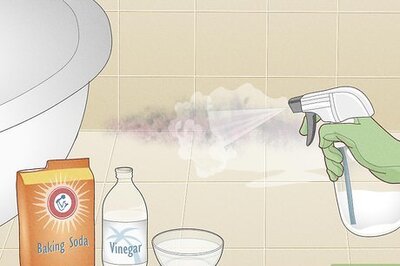
views
An anti-inflammatory, Mediterranean-style diet -- already beneficial to heart health -- could help prevent fractures linked to reduced bone density in certain women, according to researchers in the USA. This study, which analyzed data from 160,191 women aged 50 to 79, is published in the Journal of Bone and Mineral Research.
Numerous studies have previously identified health benefits associated with a Mediterranean diet, rich in fruit, vegetables and unprocessed foods, such as reduced risk of cancer, heart disease, as well as Parkinson's and Alzheimer's.
New research suggests that the diet could also benefit bones. According to a study from the USA's Ohio State University, women could help boost their bone density by paying attention to what they eat.
As they reach menopause, at around 50 years of age, many women discover that they are suffering from osteoporosis, a condition that weakens bones, making them more likely to break or fracture.
The scientists studied a group of 160,191 women aged 50 to 79 years old with no previous history of bone fractures, from 1993 to 1998, to evaluate the risk of fractures to the hip, the lower arm and other parts of the body. Their diets were rated for inflammation, three months before the tests, and given inflammation scores based on 32 food components.
Younger white women following high-inflammatory diets were found to be at greatest risk of suffering fractures. This group of women had a twice greater risk of hip fracture than women with the lowest inflammatory scores.
However, across all participants, no correlation was found between high-inflammatory diets and fractures in general. In fact, the researchers saw a slightly lower risk of lower arm fracture in women with the highest dietary inflammation ratings. They suggest that women with lower inflammation scores are likely to be more physically active, in turn putting them at greater risk of falls.
Note that a Swedish study recently concluded that increased physical activity (at least 3½ hours per week) prior to puberty and during growth could boost the development of bone mass.
Women with the least inflammatory diets had lower bone densities at the beginning of the study, but they lost less bone than women following high inflammatory diets. This could be explained by their smaller builds, the study suggests.
Maintaining bone density is important for aging women, especially after menopause, when bone density can drastically drop.
In conclusion, all factors favoring inflammation could potentially increase the risk of osteoporosis and fractures, according to the study. As a result, a Mediterranean diet rich in fruit vegetables, fish, omega-3 and whole grain cereals could be beneficial. Vitamin D (sardines, mackerel, calf's liver, eggs, cod liver oil) is also essential to the development and regeneration of bone, especially for those who exercise regularly.



















Comments
0 comment